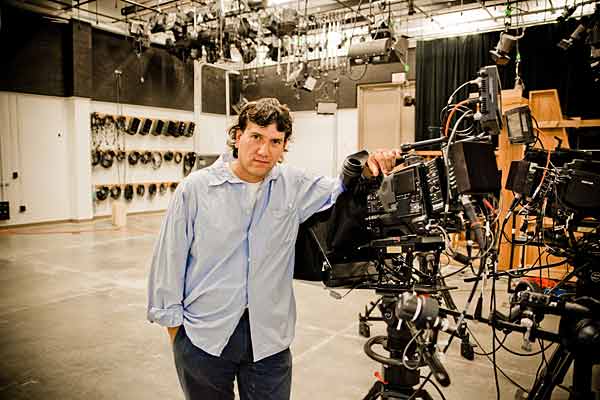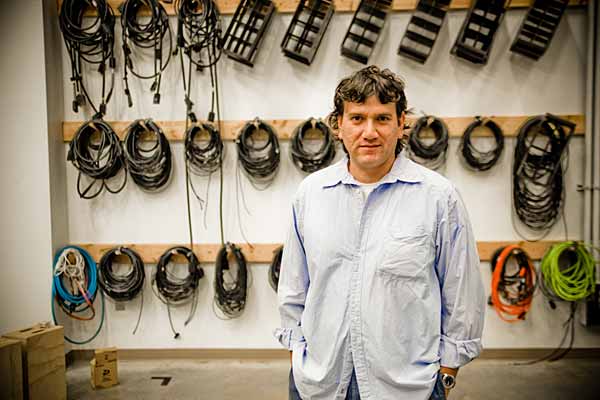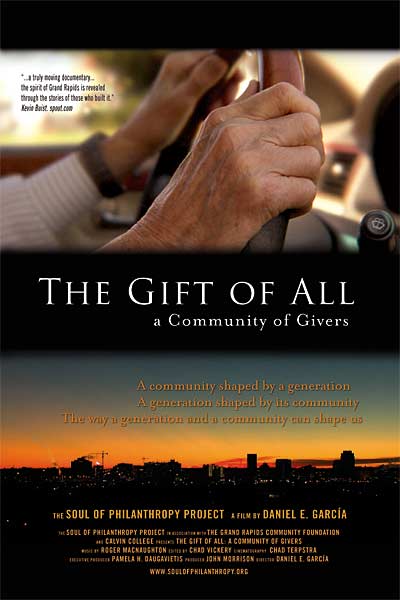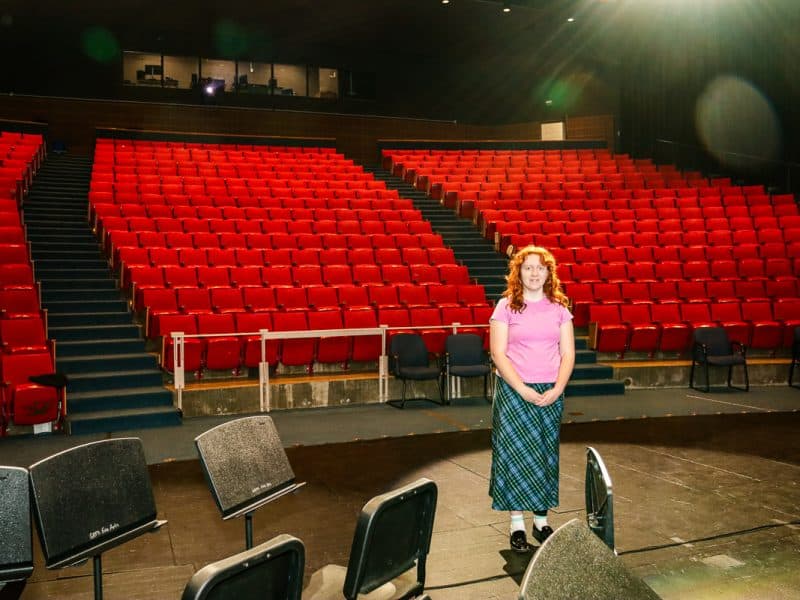No Short Cuts
While it’s great to have the most advanced equipment to shoot videos in high definition, technology always takes a back seat to the art of storytelling, says Daniel Garcia. Far from a dying art, storytelling is alive and well in metro Grand Rapids through the area’s film and production programs.
Daniel Garcia is a preacher for patience — for tax incentives that have brought filmmakers to Michigan, for time to let two fledgling film festivals take root in Grand Rapids next week, for everyone to sit through a slower moving film to let it tell its story gracefully.
While his own creation, “The Gift of All, A Community of Givers,” isn’t a particularly long film at 54 minutes, it was an exercise in patience for Garcia to direct the documentary of 32 influential West Michigan philanthropists that left hours of interviews on the cutting room floor. It was worth the wait. The result is a polished documentary that is being shown at the Michigan Film Festival on August 29.
Garcia, assistant professor at the Calvin College Department of Communication Arts and Sciences, is intimately familiar — and practical — about what filmmaking can and can’t accomplish for the state’s economy. Filmmaking is certainly no quick way for Michigan to get out of the nation’s unemployment cellar, he says.
But if Michigan sticks to its guns like the heroes we cheer in classic Westerns, the state can stop its brain drain and retain talented, creative indivdiuals in fimmaking — no different than trying to staunch the flow of our engineers, scientists and teachers to other states, Garcia says. And that in itself is worth the investment. In an interview with Rapid Growth, Garcia, 41, gives his take on filmmaking and the need for letting things unfold.
Can West Michigan, or even Michigan for that matter, really compete with other states when it comes to filmmaking?
Right now, we are competing with states like New Mexico and Georgia, but they are not Michigan. You have everything pretty much what you want right here. You don’t have the four seasons there, you don’t have the coastline that we have, you don’t have the workforce as eager and enthusiastic as you have here, you don’t have the locations that you have here anywhere else. In the city of Detroit where unfortunately the population is about half what it was, you have entire blocks or streets that are completely available for filmmaking. If we keep a steady hand at trying to attract the film industry, they will actually move operations here.
But aren’t the film producers just chasing where its cheapest to produce films, and Michigan has the most generous tax incentives right now? Won’t they just move on when the incentives end?
We have seen tremendous excitement from the film industry to come to Michigan, obviously because the financial incentives. But there also have been about 40 films shot here with only the second year of incentives, and that is simply remarkable. If we give it (incentives) more time, if we are patient, then it will build film production in the state for the long run. It’s like any other business, even like starting a farm — we have to give it time. We have already made some investment, and we are not a rich state. And I understand how people can be skeptical about supporting filmmaking with taxpayer money: I would be too. But when a company makes a film in Michigan, it comes here and rents equipment, lighting, et cetera. The local company will grow if it has steady work, and the film company will no longer need to go to Chicago for all of its equipment. If we can pull this through at least two more years, we will definitely see stronger, larger companies that are local.
How about the types of films that are benefitting from the Michigan incentives? Isn’t it true that for every Gran Torino there are dozens of low-budget bottom-feeding flicks that go directly to DVD and never make it into the theaters?
For every one Gran Torino, you may have 40 bottom feeders as you call them. That has happened in Michigan over the past year, but that very same thing happens in Hollywood every year. Many of the films that we see here (in the theaters) are the cream of the crop of what has been produced. You have a pyramid, and I think we need to appreciate how extraordinary it was that Gran Torino was shot in Detroit. It was a big risk for the producers. Usually they will send a few small things over to see how it goes in a location, then they will risk a major production. But with Gran Torino, it was immediate. It’s normal to have the small things with questionable subjects to appear in a place first, but we cannot afford to start being picky. We cannot afford to say I don’t like “The Genesis Code” because it’s science fiction and it’s not going to win an Oscar. As a professor, I like any serious, professional practice that my students can get producing a film. If you graduate with a degree in film production, you want to work, you want to do something to pay your rent — even it if is a small film. And if you get better and better, you will have your chance to do Gran Torino.
Doesn’t it seem that the only jobs that a film production creates for local people are low paying, semi-skilled positions, while all the highest paying jobs do to out-of-state people?
If you’re talking about a film with a budget of $5 million on up, usually the director, cinematographer, the producers will be coming from outside of Michigan at this point. But that isn’t any different than any other industry that opens up a facility in a state. Even if you open up an automotive plant here, it doesn’t mean that all the upper management will be coming from Michigan. You cannot dictate how the company will organize its business. It will take time and patience to make the transition from only funding relatively low-paying jobs in the film industry. But we have talented people, and it will happen.
Then has West Michigan made the investment in facilities and equipment that we need to compete for video and film productions?
The first investment needs to be made in individuals, not equipment. It’s like saying to someone: “These are beautiful photographs, you must have a nice camera.” Calvin College and other area institutions — Grand Valley State University, Cornerstone University, the Compass Film Academy in downtown — have made this investment in individuals. We’ve made quite a commitment to teaching film studies, production and media studies. We are a very serious liberal arts education facility, so we believe in not just telling people how to press buttons, but also how to think about it, reflect on it. Now thanks to a generous endowment, we also have just gotten equipment that can do what any major broadcasting company can do. HD is the new standard now, and as far as I know, we are the first educational facility that has everything in HD. And high definition multiplies the amount of information exponentially, you have much more control over color and other technical aspects. The film look is much more achievable now, and this is something that is ahead of its time. But still the most important thing is whether you know how to tell the story.
What’s your take on the Michigan Film Festival and the Grand Rapids Film Festival that are coming up in Grand Rapids?
I’m optimistic about the film festivals here because it’s changing the culture in the area. People may start paying attention to Grand Rapids is a center to view movies, but to establish a film festival is a serious business. Hopefully these will become institutions, not just novelties to pass the time of summer. We just need to exercise patience, but I think it will happen.
Matt Gryczan is the managing editor of Rapid Growth.
Photos:
Daniel Garcia, assistant professor at the Calvin College Department of Communication Arts and Sciences (2)
Photographs by Joshua Tyron -All Rights Reserved














